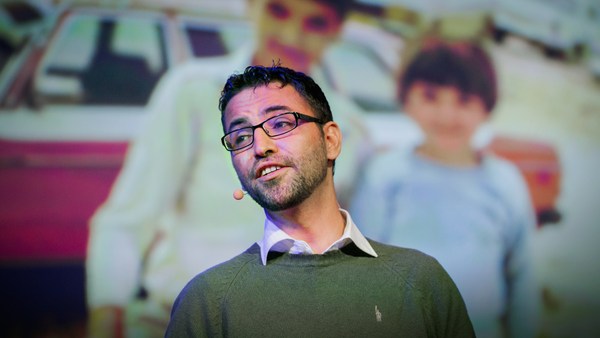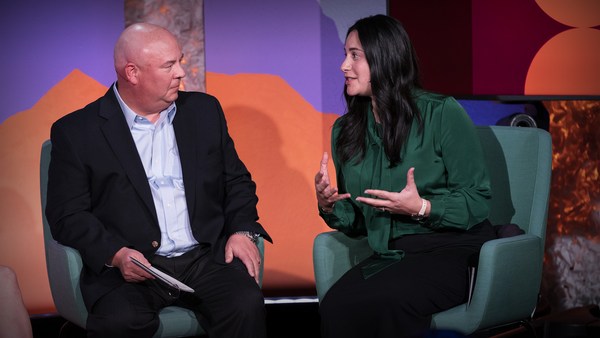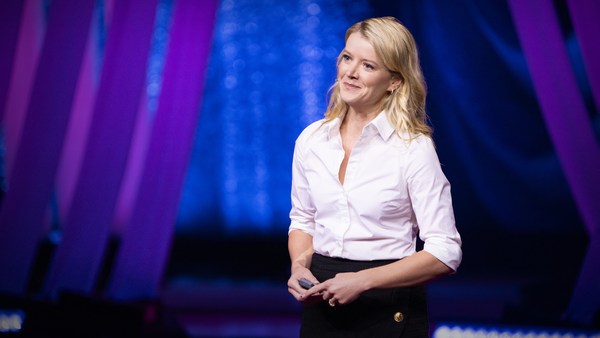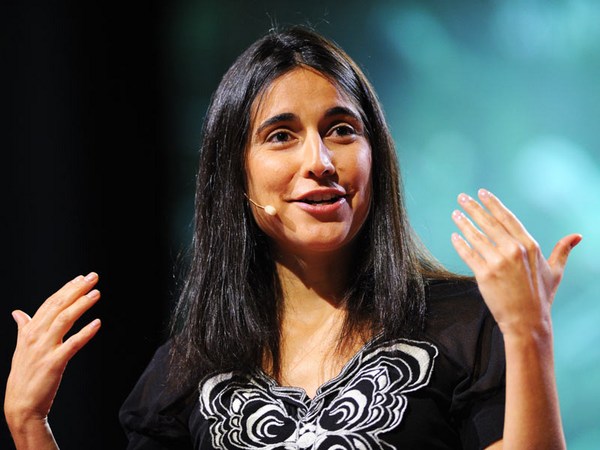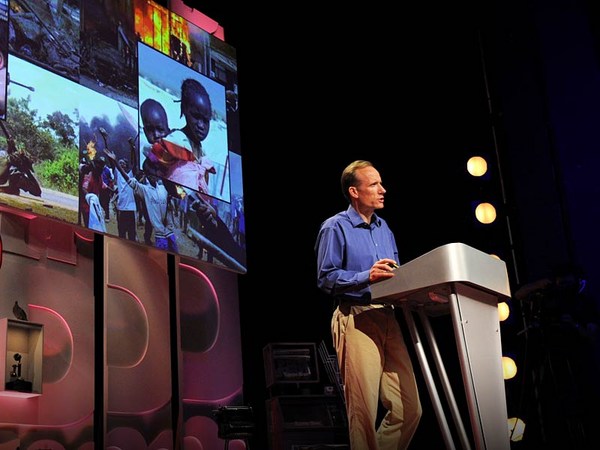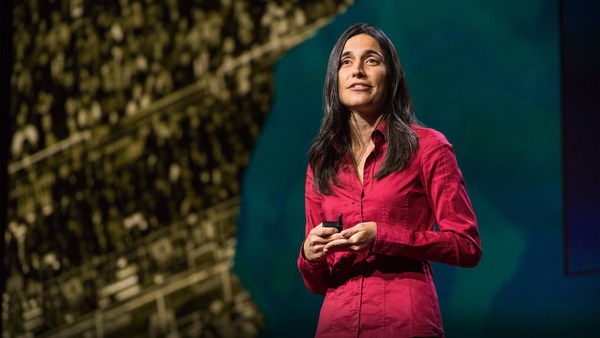Maoz Inon: You know, Aziz, only four days ago, last Thursday, we buried the remains of my parents. My mom was burned so badly, she could not be identified. I lost them on October 7. I lost so many of my childhood friends, their parents, their children. Many were kidnapped to Gaza. I was drowning in an ocean of sorrow and pain. I was broken into pieces.
A few nights after losing them, I had a dream. I was sleeping at night, crying. My entire body was in pain. And through my tears, I could see everyone crying. The entire humanity was crying with me. Our tears went down on our faces to our bodies. Our bodies were wounded, damaged from the war. And then our tears washed our bodies and healed it, making it whole. Whole again. And then our tears went down to the ground. And the ground was red from blood. Our tears washed the blood from the ground, purifying the ground. And then the ground was beautiful and shining. And on that ground, I could see the path. The path to peace. I woke up shaking. And immediately I knew that this is the path I must choose. The path of not taking revenge. The path of reconciliation.
And you've been walking this path for decades. We met only once before October 7, even that was for two minutes, maybe. But you were among the first ones to reach out, send your condolence, support. And I will always love you for being there for me in my hardest time.
Aziz Abu Sarah: Now Maoz when I sent you that message to offer my condolences after your parents were killed, I was surprised by your answer. Not just to me, but your public answer. Because you said you're not only crying for your parents, you're also crying for the people in Gaza who are losing their lives, and that you do not want what happened to you to be justifying anyone taking revenge. You do not want to justify war. And it's so hard to do that. So much easier to want revenge, to be angry. But you are a brave man.
I needed much more time when my brother Tayseer, who was 19 years old, was killed by Israeli soldiers. I was angry, I was bitter, and I wanted vengeance. I was 10 years old and I thought, there is no other choice.
And only eight years later, when I went to study Hebrew with Jewish immigrants to Israel, that's only when I realized that we can be allies. We can be partners. And I realized that I do have a choice, regardless of what other people do, the choice is always mine. And I do not want to take revenge. That when I choose to be angry and hateful I'm being a slave to the person who killed my brother.
These last few months [have] been like a nightmare that never ends. Everyone I know in Gaza have lost family members. My friend Abdelrahim, he lost 50 people in his family. In this photo you can see, all these kids have been killed. And in the upper middle photo, the father of these kids was in Israel when they were killed. And ... He wanted to come back to see his kids one last time. He couldn't. He ended up back to Gaza, but never was able to make it to his house. What’s amazing, though, is Abdelrahim is just like you. I talked to him yesterday, and he said, "I'm still as committed to peace as I was before. I do not want my story to lead to hate." And even now, as his parents are in northern Gaza, unable to get food, unable to leave, he's still committed to this message. And it makes me wonder, how do you make such a choice in the midst of so much tragedy?
MI: You know, I've been interviewed like 100 times in the recent months, and this is the most easiest question. It's for my parents. It's my parents' legacy. And when we put their remains in the ground, I realized that they prepared me for that moment. They taught me what to say and how to act after they will be killed.
I was born in a kibbutz, just a kilometer and a half from the border with Gaza, that was established by my grandparents. They were both Zionist pioneers, immigrated to Palestine under the British Mandate about a century ago. And my father was also born in this kibbutz, and my father was a farmer. It's very, very difficult to be a farmer, even more difficult than to be in the tourism industry. And one year, I remember that one year there was a drought. And then the second, there was a flood. And the third, there were insects. And at the end of each of those devastating seasons, my father will always tell me, "Maoz, next year I'm going to sow again. Because next year is going to be a better year."
And my mom was a very talented mandalas painter. She painted thousands of mandala. And from all the mandalas she painted, she gave me only one as a present. This is the one she gave me. And on this mandala, this is for you, I made it for you. And on the mandala she gave me, she wrote, "We can achieve all our dreams if we'll be brave enough to chase them."
And in the last 20 years I've been chasing and fulfilling many dreams. I opened the first guest house ever in the old city of Nazareth, the Fauzi Azar. I was cofounding the Jesus Trail, Abraham Hostel and tours and many other dreams. And in all those dreams, I was following five steps. Dreaming, many of us forgot or [aren't] brave enough to dream. Creating a partnership and a coalition with as many stakeholders as possible. Reaching shared value and common ground between the partnership. Writing a very detailed road map and executing. And I believe this is exactly what we need to do now in order to make our dream into a reality. And I was partnering with Palestinians, with Israeli, with Jordanian, with Egyptian. And I learned that the first step in reaching a shared society and a shared future is knowing the other side's narrative. And following your work for many years, even though we met only once, I think there is no one in the world that knows better how we can take our divided narratives and make them into a shared future and a shared society. So thank you for all that you've done so far. Really, it's amazing.
AAS: Now Maoz, I worked in 70 countries in peace and conflict. And everywhere I worked, I found that we share the same problems. The cause of conflicts are the same. It's lack of recognition, not willing to understand each other’s historical narrative and not having a shared vision for our future. And not doing those things is a fatal mistake. We live next to each other, and yet we are so divided. We cannot talk, we cannot meet, we cannot have a conversation. There are roadblocks, checkpoints, there are walls that divide us or societal pressure that makes us not being able to talk to each other. And I know this because my dad's first time ever going to a synagogue was in the United States when he came to visit me. He went to a Friday prayer, but the mosque was too full and the Muslim community rented a synagogue. So he ended up praying in a synagogue.
(Laughter)
And he came back and told me, and he was so excited about it. And I thought, Jerusalem is full of synagogues. And yet his first time ever being in a synagogue is in the States. That's how divided we are, how little we know about each other.
But we also must learn to ask hard questions, be honest and willing to listen. My dad’s first time to a peace meeting was one that I organized. And when he came, he asked a question that I thought, oh my goodness, how could you do that? He said, "Did the Holocaust happen?" And just like the gasps we hear here, everybody in the meeting was terrified. I thought, I'm going to lose my job for my dad asking the question and regretted inviting him to the peace meeting.
(Laughter)
But you know what? Because of that question, one of the Holocaust survivors in the meeting, he took my dad and 70 other Palestinians to the Holocaust memorial. It was the first time such a big delegation going there, and they had this hard conversation. Later, the Israelis in the meeting ended up coming and having a similar conversation about Palestinian history and narrative, going to a town that was destroyed in 1948, in the Nakba. I've been working in the last 20-some years and finding ways to ask those questions. In 2009, I co-founded Mejdi Tours and later Interact International with my Jewish friend, Scott. To do that, to give a context, a place where we can build a movement of citizen diplomats, where you can have dual-narrative tours, an Israeli and a Palestinian co-leading a tour, and then in many other, dozen of other countries. So we can find a framework, we can say: How can I learn from you? What is it that we can push each other to do? And maybe that’s the question: What have we learned from each other?
MI: Yeah, so regarding to your father's questions, I think it was November that a very, very good Palestinian friend asked me, “Maoz, can I ask you a difficult question?”
I said, "You are my friend, You can ask whatever you like."
She asked me, "Maoz, maybe your parents' house was burned from the crossfire, from the IDF, and not from the Hamas?” And she was literally denying October 7, and I was shocked. I didn't know what to say.
And then I stopped for a second and I asked, I told her, "You know what? What does it matter? What does it matter? My parents are dead. And they are dead because of the conflict and the war that has been going on for so long. And it's our mission to stop it."
And I learned so much in the recent months from speaking, dialoguing with Palestinians, I learned that we must forgive for the past. We must forgive for the present. But we cannot and should not forgive for the future. Not to ourself and to no one else if you want to make the future a better future. I learned that our stories were split in the past, with a different chosen son of Abraham. And for many centuries, our stories were parallel. And the gap between them is becoming wider and wider as we are getting to the present. And it began to get wider with the beginning of the Zionist movement and the Palestinian national movement, and with all the war we've been waging on each other, it's becoming wider and wider. And now in the present, it's as wide as ever. Our stories were never [as] apart as they are now.
But there is a miracle. There is a miracle, our stories meet. They meet in the future. We meet in the future that is based on reconciliation and recognition. That is based on security and safety. And of course, on equality. And now we must use the same steps I used to fulfill, or we used to fulfill our previous dreams, in making this dream into a reality. We are all dreaming of peace. We are building a coalition. Palestinians, Israelis, supported from all over the world. We share the same values and common ground. We are writing now, right now we are writing a very detailed, informative road map, and we are already starting to execute. And what we are doing now, tonight, we are executing the first two chapters of our road map. We are amplifying our voices and building our legitimacy as the leaders of the future. And I could not ask for a better partner, for a better companion than you, Aziz.
AAS: Now when people hear this, and I think we are much stronger together than ever alone, we've been doing so much work on campuses with anti-Jewish and anti-Muslim hate, with helping people in our own community, finding ways to organize. But I think people can hear this and think, "So you can lose people in your family and not be angry?" And I think that’s a mistake. We are angry. I am very angry. Every time I read the newspaper, I'm angry. Every time I talk to one of my friends in Gaza, I am angry. But the thing is, I do not let anger, and we do not let anger, drown us in hate and wanting vengeance. Instead, I think of anger like a nuclear power. It can lead to destruction, and it can make light. And my hope is that we continue to use anger as a way to bring people together, to ask ourselves, "What can I do to make things better?"
MI: And that brings me to the most important ...
(Applause)
I love you.
And it brings me to the most important lessons I learned. That hope is an action. It's not something you find, not something you can lose. It's something you are making. And I came up with a very basic formula, recipe, how to make hope. First, like love, you cannot do it by yourself. You are doing it with others.
(Laughter)
And you are starting, we are starting because now it's we, we are starting by envisioning a better future. And then we are acting to make this future into a reality. It's act, we must act. And through the process, we always need to convince, first ourselves, and all our coalition and everyone that is willing to listen, that our actions are effective. It's very simple. It's very simple. And this is what we must do. And I believe that if we will be brave enough and brilliant enough, we can make this future into a reality in the near future. That by 2030 or before, there's going to be peace between the river and the sea.
AAS: You know ...
(Applause)
We say today, ideas change everything. And I have an idea. People look at us and think we are divided because you’re Israeli and I’m Palestinian, Muslims and Jews. But if you must divide us, people should divide us as those of us who believe in justice, peace and equality, and those who don’t, yet. And our work here is to invite everyone, to invite you, to join us into our work, into bringing everyone together to take a stand that says, “We are not enemies.” Do not be mistaken. We lost our family members, we did not lose our sanity, we did not lose our minds. We are here together saying we will fight on the same side for justice and for peace.
Thank you.
(Applause)
